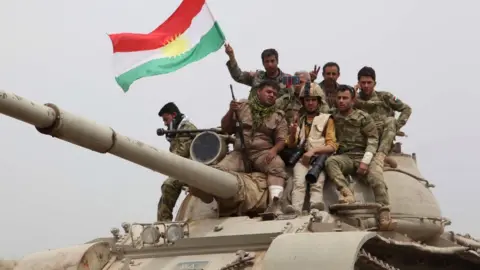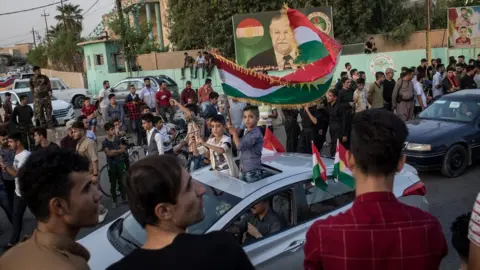Iraqi Kurds send reinforcements to Kirkuk amid army 'threats'
 AFP
AFPThousands of Kurdish fighters have been deployed to Iraq's disputed Kirkuk region, officials say, amid fears that government forces want to retake it.
The autonomous Kurdistan Region's Vice-President, Kosrat Rasul, said it was responding to "threats" by the army.
Prime Minister Haider al-Abadi has said he would not use the army against Iraqi citizens, but convoys were seen heading towards Kirkuk late on Thursday.
The move comes two weeks after the Kurds held an independence referendum.
Voters living in Kurdish-controlled areas - including Kirkuk - voted overwhelmingly in favour of secession, prompting calls from Kurdish officials for negotiations.
But Mr Abadi said the referendum was illegal and demanded it be annulled.
Kirkuk is an oil-rich province claimed by both the Kurds and the central government. It is thought to have a Kurdish majority, but its provincial capital has large Arab and Turkmen populations.
Kurdish Peshmerga forces took control of much of the province in 2014, when Islamic State (IS) militants swept across northern Iraq and the army collapsed.

The Iraqi parliament asked Mr Abadi to deploy troops to Kirkuk and other disputed areas after the referendum result was announced, but he said last week that he would accept them being governed by a "joint administration" and that he did not want an armed confrontation.
On Thursday, the prime minister and the Iraqi military reiterated that they had no plans for a military operation in Kirkuk and were focused on recapturing the last IS foothold in Iraq, around Rawa and al-Qaim near the border with Syria.
"We won't use our army against our people or to launch a war against our Kurdish citizens," Mr Abadi said in a statement, according to Reuters news agency.
However, the BBC's Orla Guerin saw a convoy of soldiers, federal police and Shia militiamen from the paramilitary Popular Mobilisation force moving towards Kirkuk.
Some made victory signs from armoured personnel carriers. One said they were going to Kirkuk to crush the Kurds.
Our correspondent says this may be just a show of force by Baghdad, but that it is a risky move. There are fears that Kirkuk could be the spark that ignites a civil war, she adds.
 Getty Images
Getty ImagesOvernight, the Kurdistan Region Security Council expressed alarm at what it called a significant build-up of pro-government tanks, artillery, Humvees and mortars in Bashir and Taz, in southern Kirkuk.
"These forces are approx 3km from Peshmerga forces. Intelligence shows intention to takeover nearby oil fields, airport and military base," it said on Twitter.
On Friday morning, Mr Rasul was quoted by the Rudaw news agency as saying at least 6,000 Peshmerga fighters had been sent to Kirkuk to support the tens of thousands already stationed there.
"There are threats by the Iraqi army that has deployed forces near Kirkuk supposedly to attack Kirkuk. But I don't believe it will be easy for them to do that."
"We do not want war, and we seek to solve problems through dialogue," he added.
An unnamed general was quoted by AFP news agency as saying troops had already taken one base after Peshmerga fighters withdrew.
However, the Iraqi military's War Media Cell insisted that an operation had not begun. A statement posted on Facebook said its forces were "still clearing, inspecting and holding" areas recently retaken from IS.
